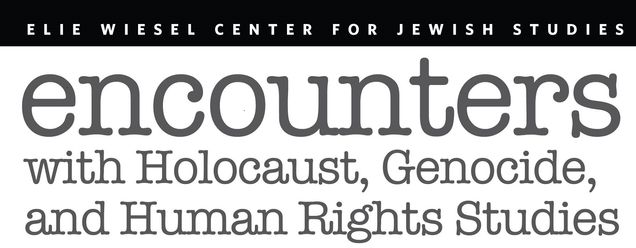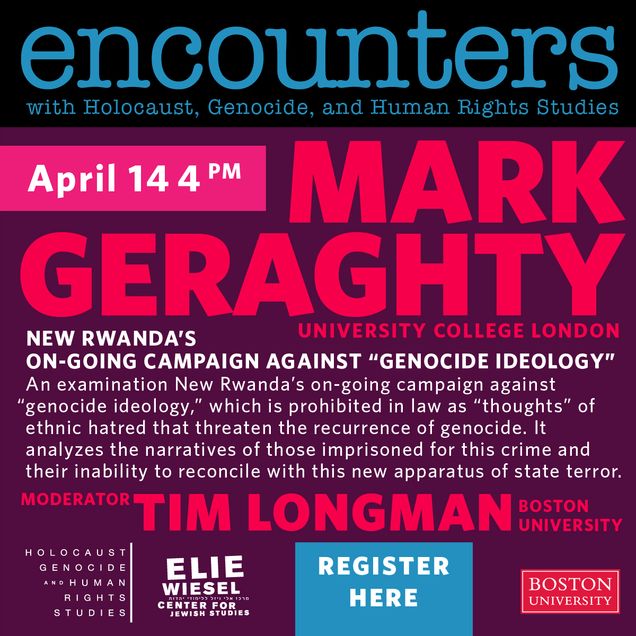Encounters with Holocaust, Genocide, and Human Rights Studies

The aim of the new Encounters series is to facilitate conversations across disciplines on the study of the Holocaust, genocide, and human rights. The inaugural series focused on “The Politics of Genocide,” with the goal to broaden the understanding of genocidal and violent events in modern and contemporary politics. The series was curated by Professor Nancy Harrowitz (Romance Studies), Director of the Holocaust, Genocide, and Human Rights Studies Minor Program, and Dr. Sultan Doughan, Postdoctoral Associate at the Elie Wiesel Center.
Patterns of Genocide: California and Beyond
Benjamin Madley
December 2, 2020
Dr. Benjamin Madley (UCLA) is author of An American Genocide: The United States and the California Indian Catastrophe, 1846-1873 (Yale University Press, 2016). In this talk, he discussed the genocide of Native Americans in California in light of the international UN Genocide Convention and why this genocide has been buried for so long. The discussion extended to the emergence of new scholarship on the subject and its relation to the definition of genocide as an actionable crime based on international law. The talk was followed by a response by Professor Timothy Longman. Longman is a founding member of the program in Holocaust, Genocide, and Human Rights Studies at Boston University. His research and teaching centers on the genocide in Rwanda.

Voicing and Silencing the Memory of Loss: Lullabies and Stories from Armenian Women in Istanbul
Melissa Bilal
March 9, 2021
Dr. Melissa Bilal (UCLA) is a historical anthropologist who uses ethnomusicology as her lens. Her talk illustrated the capacity of lullabies sung by Armenian women in Istanbul to produce knowledge, functioning as a survival strategy under the regime of denial following the Armenian Genocide, in 1915. She argued that this knowledge is intimate and affective, bodily and instantaneous. It is a way of knowing “otherwise” that has the potential to form alternative ways of relating to history. Roberta Micallef, Professor of World Languages and Literature at Boston University, served as respondent, drawing from her expertise in 19th- and 20th-century Ottoman and Turkish literature and current research into women’s life writing.

Holocaust Memory and Britain’s Religious-Secular Landscape
David Tollerton
March 24, 2021
David Tollerton (University of Exeter) asked the audience to consider the politics regarding the construction in central London of a major new Holocaust memorial and learning center, located next to the Houses of Parliament. His talk illustrated how the memorial is symbolic of the extent to which Holocaust remembrance has come to inhabit an increasingly prominent place in British public life. While it intersects with the experiences of Jewish, Christian, and Muslim communities, it also points to increasing secularity. With an eye to this last point, Dr. Tollerton highlighted new forms of sacrality that surround state-supported initiatives. This event was moderated by Abigail Gillman, Professor of World Languages and Literatures and a member of the Jewish Studies faculty at Boston University.
The New Rwanda’s Ongoing Campaign Against Genocide Ideology
Mark Geraghty
April 14, 2021
Mark Geraghty (University College London) examined the contemporary Rwandan government’s use of laws passed in the wake of the Rwandan genocide that prohibit “genocide ideology.” These laws criminalize “thoughts” of ethnic hatred that threaten the recurrence of genocide and have been used by the state as a tool to quell dissenting political voices. Geraghty introduced the audience to narratives of those imprisoned for this crime and their inability to reconcile with this novel instrument of state terror. Serving as respondent was Rwanda expert Timothy Longman, Professor of International Relations at the Pardee School of Global Studies at Boston University.

